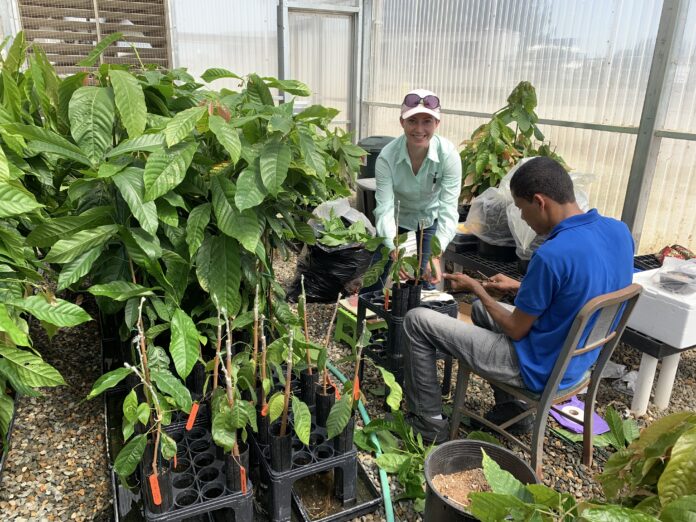Partnership expands on cacao crop research
Mars Wrigley, the world-famous manufacturer of chocolates, candies and gums, recently launched a new research program with UC Davis focused on cacao. Construction of a new on-campus greenhouse supported by Mars for cacao plant research is nearly complete.
Cacao is a relatively unexplored plant compared to other crops that are considered major sources of energy, according to David Mackill, the cacao genetics and breeding director at Mars Wrigley and an adjunct professor in the Department of Plant Sciences. Conducting fundamental studies to improve the basic understanding of cacao can have a great impact worldwide, Mackill said.
“More productive cacao trees that are resistant to pests and diseases means farmers can grow more high-quality cocoa on less land, improving their productivity and their lives with less risk of deforestation,” Mackill said via email. “This research partnership between UC Davis and Mars and these important new facilities will help achieve that.”
The partnership between Mars and UC Davis began in 1974. Since then, the company has worked with multiple departments and programs at UC Davis, conducting research on crops such as cocoa, peanut and mint.
Research on sustainability and plant disease control are also areas of great focus. Alan Bennet, a distinguished professor in the Department of Plant Sciences, ran a research project with Mars focused on identifying corn varieties in Mexico that were able to fix their own nitrogen.
“This research supports the development of more sustainable agriculture,” Bennet said. “It will have the biggest impact on undeveloped areas where nitrogen fertilizers aren’t even available. It can really enhance food security in important ways and in important parts of the world.”
Because of the increasing world population, industry and academia are working together to find sustainable agricultural operations that can benefit future generations.
“Mars can inform scientists, like myself and others, about how a company would look at the world and the kind of things they need,” Bennet said.
The collaboration between academia and industry will only increase in the future, Bennet said.
“It’s very important for our world to meet its food production demands by 2050,” Bennet said. “It’s going to need new technologies, creative ideas and disruptive approaches. This often comes from universities. In order for those disruptive ideas to be translated, there needs to be a strong collaboration with industry.”
Ann Filmer, the communications director of the Department of Plant Sciences, also agrees that the partnership between industry and academia will continue to expand because of the emerging challenges in the production of healthy and affordable food worldwide.
“With global population growth, a changing climate, and projected increases in drought, the partnerships can also address short- and long-term challenges — such as adequate global food needs, water supplies, and environmental sustainability — and how to solve them on a global scale,” Filmer said via email.
UC Davis conducts numerous research projects with the goal of improving food production and sustainability both locally and internationally, Filmer mentioned. In addition to collaborating with industry, researchers in the department of plant sciences work with various agencies, governments and nonprofit organizations.
Mackill noted that, because cocoa is under-researched, there are great opportunities for students and scientists to explore the plant.
“Cocoa is a very exciting research topic and UC Davis students interested in pursuing a career in cocoa plant science and research should take advantage of having one of the foremost cocoa plant science and research programs in the world right here at UC Davis,” Mackill said.
Written by: Yantong Ye — science@theaggie.org




